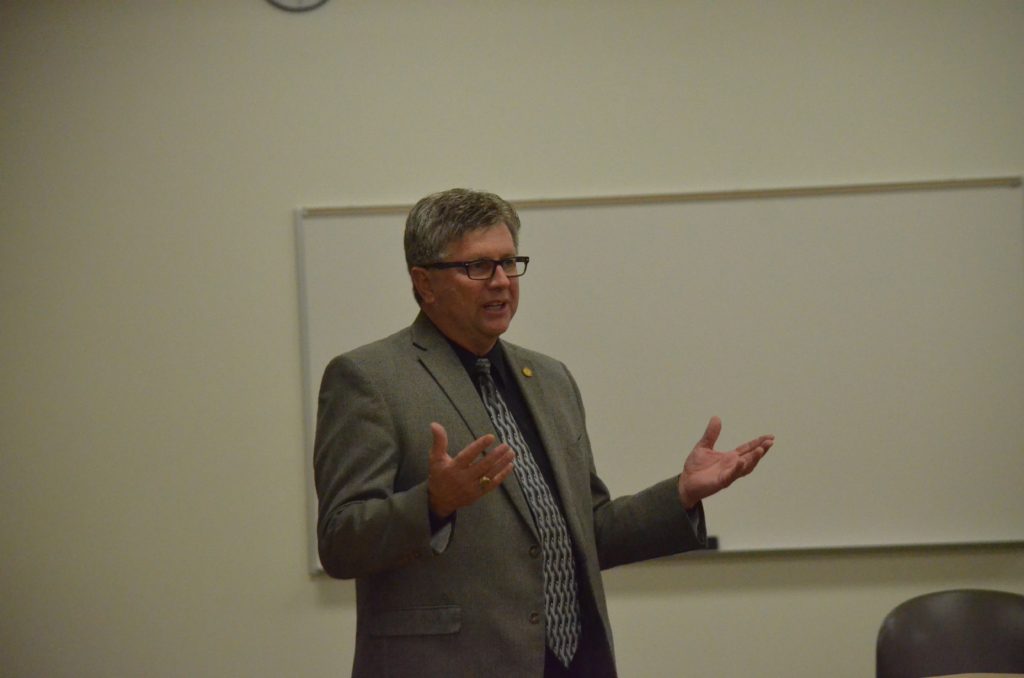Students and community members ranging from ages 8 to 80 gathered around Sen. Tom Casperson as he spoke about topical issues such as road construction, speed limit increases and mental health during a town hall meeting on Monday, April 2.
The meeting took place at 7 p.m. in room 1320 of Jamrich Hall, and roughly 40 attendees participated in the discussion.
Casperson, the republican senator for the 38th district that includes all but three counties in the U.P., worked in a group of two Democrats and two Republicans, and opened up the meeting by stressing the importance of coming together in bipartisan fashion in order for legislature to move forward. People don’t have to hate each other because they disagree, Casperson said.
“We could disagree with each other, but where we disagreed we just respected our differences, and where we agreed we fought like cats and dogs for the Upper Peninsula,” he said.
Casperson will leave the senate in December, having reached the office’s term limit, but he said the work hasn’t slowed down.
Having a statewide land management plan is one of Casperson’s goals before leaving office, and he is hoping to have it concluded in the next month. This will ensure that the government is responsible for payments in lieu of taxes (PILT), which means that anyone who is tax exempt, the DNR for example, still has to pay full price for land to ensure that local government doesn’t lose the funds that would’ve come from the property tax, Casperson said.
“In my opinion, it takes the local units of government and they fall short, because they’re not getting [the funds] they’re supposed to be getting,” Casperson said.
“Now, the [DNR] has an incentive to communicate with the legislature,” Casperson said.
Another important topic of concern was County Road 595, a prospective 21-mile road for trucks traveling between the Eagle Mine and Humboldt Mill, because the Environmental Protection Agency rejected the road before Marquette County applied for the permit, and that wasn’t right, he said. Some audience members supported the rejection, but Casperson was most upset about the “precedent.”
“The process is more important than the road itself,” he said.
In addition to road construction, the raising of the speed limits from 55 to 65 mph on roads like U.S. Highway 141, M-28 and U.S. Highway 41 from Marinette to Houghton was a concern raised on Monday. Although there has been a mixed reaction to the possible change, Casperson said he supports the increase, and the Michigan Department of Transportation is reviewing studies done by the Michigan State Police before any changes are made.
“We needed to make sure that studies were done in order to justify the speed limits,” Casperson said.
Mental health was another large facet of Casperson’s meeting.
There is seldom space in mental health facilities for mentally ill patients, and law enforcement is facing repercussions from this, Casperson said. If there’s no room in the Upper Peninsula facilities, it takes two officers to drive a mentally ill patient downstate. He suggested that there should be a smaller facility in the Upper Peninsula to help combat this issue.
“The mental illness issue is a major issue, period. We’re seeing more and more of that. We have to collectively get our arms around that as a society and as a government,” he said. “[…]Putting our head in the sand and suggesting it doesn’t exist is just creating more problems.”
Arguing about funding before giving people proper mental health facilities is like putting the cart before the horse, he said.
“We have to have a place for people to get started,” he said.
Next to mental health, the duty to notify was one of the hardest issues Casperson has had to deal with in all of his years as a senator, he said. University administration is obligated to notify authorities once a victim of sexual assault speaks about what happened, and this is not something he is in full support of. It’s harder for students to talk to university administration about sexual assault because of the duty to notify, he said.
“There might be some people who just want to get it off their chest and talk to somebody about it,” Casperson said. “They don’t want to feel like they’re victimized twice by getting put out in public for the whole world to see and have to deal with that.”
After his speech, Casperson took questions about concerns from his speech. The meeting went well, he said, despite the clear political differences of people sitting in the room.
“Marquette has been good to me; this region has been good to me,” Casperson said in a post-meeting interview. “Hopefully I can go around and do a few of these (meetings) to let people know that, and say thank you.”























